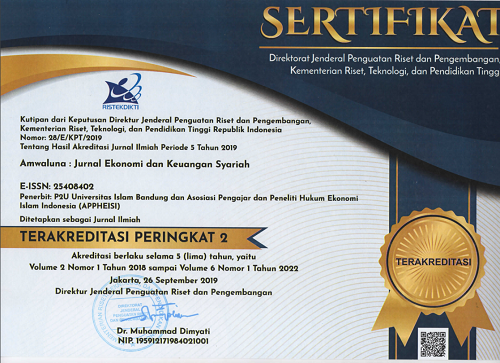Halal Tourism Village Potential Through Asset Based Community Development
Abstract
Village tourism" and "halal tourism" are two concepts that are currently become the priority of government programs and the center of global attention. Combining these two concepts is not easy. With the Asset Based Community Development (ABCD) approach, this study aims to map the potential of Dayeuh Kolot Village, Subang Regency as an asset in implementing and developing halal tourism. This research uses descriptive qualitative methods, with interview and FGD data collection techniques. The focuses of this research are: first, to map the recognition and knowledge of the concept of halal tourism from the stakeholders. Second, to identify tourist destinations as resources owned village. The results showed that the village’s potencies for supporting tourism had been identified, utilized, and initiated by authority of village leaders. The Village also has a fairly high potential of natural resource, but it has not meet the requirements of halal tourism industry standards. The village leaders, tourism actors and community groups are familiar and understand the concept of Halal Tourism Village, but were not ready to implement it. Socialization, collaboration, and appropriate regulations are still needed for Pentahelix stakeholders in rural areas for the development of halal tourism villages. As an implication of this research, it is necessary to strengthen the religious aspect, i.e., increased the understanding of Islamic law of the "halalness" of tourism products and services that are tangible, as well as intangible aspects of tourism such as cleanliness, honesty, tolerance and physical and psychological health.
Keywords
Full Text:
PDFReferences
Andriani, D., Khalikal, K. A., Aqmarina, L., Nurhayati, T., Permanasari, I. K., Binarwan, R., Murniaty, D., Priyatmoko, R., Swasti, W., Prihartini, R., Nuryadin, & Anggraini, A. P. T. (2015). Kajian Pengembangan Wisata Syariah. In Deputi Penelitian Dan Pengembangan Kebijakan Kepariwisataan Deputi Bidang Pengembangan Kelembagaan Kepariwisataan Kementerian Pariwisata (Issue Syariah Tourism, pp. 1–201).
Akyol, M. (2014). INTERNET AND HALAL TOURISM MARKETING. International Periodical For The Languages, Literature and History of Turkish, 9/8(February), 171–186.
Amadeus Traveller Trend Observatory. (2016). Halal Travellers 2016. In Amadeus-commissioned report conducted by Context Consulting (pp. 1–21). Madrid.
Bozorgaghideh, N. (2015). Halal Tourism in Kerala. International Journal of Management (IJM), IAME Publication, 6(8), 42–48.
Cancel, A. E., Cameron, G. T., Sallot, I. M., & Mitrook, M. A. (1997). It depends: A contingency theory of accommodation in public relations, Journal of Public Relations Research, 9 (1), 31-63.
COMCEC. (2016). Muslim Friendly Tourism (MFT): Understanding the Supply and Demand Sides in the OIC Member Countries. Retrieved November 17, 2017 from http://www.comcec.org/wp-content/uploads/2016/05/7-TUR-AN.pdf.
Doktor Yusuf Al-Qordhowi , Al- Halal Wa Al-Haraam . Maktabah Wahbah. Cet. 1 .2012 hal 17.
Global Muslim Travel Index 2019
Imam Ali bin Muhammad As-Sayyid Asy-Syarif, Al-Jurjani, At-Ta’riifaat. Daar Al-Fadhiilah Kairo Mesir (82).
Mastercard, B. (2016). MasterCard-Crescent Rating Global Muslim Travel Index 2016 Global Muslim Travel Index 2016, (March).
Mathie, Alison dan Gord Cunningham, Mobilization Assets for Community-driven Development, Diploma Program, Universitas Coady, 2008.
Munjid Al-Thullab Daar-Al Masyriq cet.47 Beirut Libanon (134-135). Lisan Arab: Juz 11 (167).
Oktadiana, H., Pearce, P. L., & Chon, K. (2016). Muslim travellers’ needs: What don’t we know? Tourism Management Perspectives, 20(October 2016), 124– 130. https://doi.org/10.1016/j.tmp.2016.08. 004.
Peraturan Gubernur (PERGUB) tentang Peraturan Pelaksanaan Peraturan Daerah Provinsi Jawa Barat Nomor 5 Tahun 2017 Tentang Pengembangan Ekonomi Kreatif. https://peraturan.bpk.go.id/Home/Details/137271/pergub-prov-jawa-barat-no-69-tahun-2019.
Rachmiatie, A. et al. (2020). Strategi Komunikasi Pariwisata Halal Studi Kasus Implementasi Halal Hotel di Indonesia dan Thailand. Amwaluna: Jurnal Ekonomi dan Keuangan Syariah, 4(1), 56–74.
Rachmiatie, Rachmafiria, Suryadi, Larasati AR. Classification of Halal Hotels based on Industrial
Perceived Value: A Study of Indonesia and Thailand. International Journal of Tourism Cities.
18; ISSN: 2056-5607.
Srisusilawati, P. (2020). Factors affecting tourist interest on sharia tourism. Al-Uqud: Journal of Islamic Economics, 4(2), 200-207.
Suardana, I. W. (2013). Analisis Kebijakan Pengembangan Pariwisata (Intervensi Melalui Kebijakan Pariwisata Berkelanjutan di Bali).
Thalib, M.S., Hamid, A.B., Zulfakar, M.H., Chin, T.A. (2015). Barriers to Halal logistics operation: views from Malaysian logistics experts. Int. J. Logistics Systems and Management, Vol. 22, No. 2.
Undang-Undang Republik Indonesia Nomor 33 Tahun 2014 Tentang Jaminan Produk Halal
Wilson, J. A. J., & Liu, J. (2010). Shaping the Halal into a brand? Journal of Islamic Marketing, 1(2), 107–123.
DOI: https://doi.org/10.29313/amwaluna.v7i1.11068
Refbacks
- There are currently no refbacks.
Editorial Office:
Syariah Faculty, Universitas Islam Bandung
Jalan Tamansari No. 24-26 Kota Bandung

Amwaluna : Jurnal Ekonomi dan Keuangan Syariah is licensed under a Creative Commons Attribution-NonCommercial-ShareAlike 4.0 International License.








